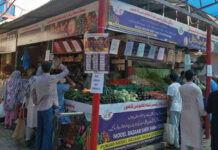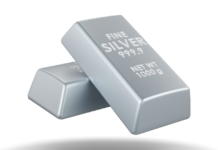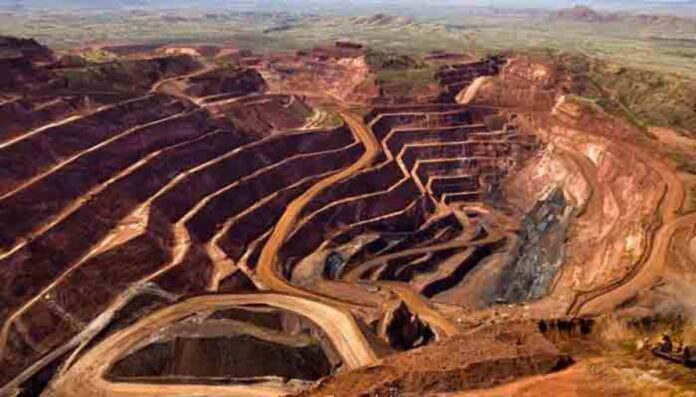Barrick Gold, one of the two companies that had previously been working on the Reko Diq project as part of a joint-venture under the name of the Tethyan Copper Company (TCC), has once again stepped into the fray and will take on the development of the project itself.
Antofagasta on the other hand has decided to get out and try its luck elsewhere. As per information received by Profit, the company has opted for a monetary compensation from the profits and revenues generated by the project that has yet to commence. The exact details of the agreement have not yet been made public, it is expected to be signed soon.
The TCC had originally been formed as a consortium between the Canadian based mining company Barrick Gold and Chile’s Antofagasta to work specifically on the Reko Diq project. However, as the dispute over the mining project heads towards a settlement, sources familiar with the matter have confirmed to Profit that Barrick will itself be taking on the project without Antofagasta.
Although it was originally claimed that the NRL (National Resource Limited) was in the lead, Profit has confirmed from sources within the NRL that they are currently out of the race. However, the firm stated that it will seek leases for other blocks in the Chagai district, including those near Reko Diq. The company also highlighted the potential of Afghanistan as a mineral rich area that can be an opportunity for Pakistan.
Meanwhile, this also means that the Tethyan Copper Company is likely to be dissolved. The development is the latest in a long series of events that has shaped the entire Reqo Diq saga. The fifth largest gold mine in the world, the deposits are buried at the foot of an extinct volcano in Chaghai district near the Iran and Afghanistan borders.
These deposits have not seen the light of day, however, because of a long-drawn out dispute between the government of Pakistan and the project’s partners, Canada’s Barrick Gold and Chile’s Antofagasta – which were working together as the now defunct TCC.
With one of the world’s biggest copper and gold deposits, Reqo Diq has estimated resources of 12.3 million tonnes of copper and 20.9 million ounces of gold. A total of 14 mineralised porphyry bodies have additionally been discovered, making Reko Diq one of the world’s significant undeveloped copper prospects.
Therefore the importance of such a huge national asset can have a monumental impact on the overall economic outlook of Balochistan as well as Pakistan. The momentous development in the case can be viewed as an end to the Reko Diq saga.
Barrick has gold and copper mining operations and projects in 13 countries in North and South America, Africa, Papua New Guinea and Saudi Arabia. The company has a diversified portfolio spanning many of the world’s prolific gold districts and is focused on high-margin, long-life assets.
How did we get here?
To understand why we’re 30 years behind schedule we have to turn back the clock. The history of Reko Diq has been turbulent to say the least, since its discovery in the 90’s it has been mired in controversy. These delays can partly be attributed to the remote and rugged location of these minerals in the remote hills of Chagai wedged between the borders of Afghanistan to the North and the Iranian border to the South.
The main reasons that has caused these colossal delays is a combination of facts that are nobody’s fault but our own for the most part. Firstly as is apparent and indicated by the fact that Pakistan globally has one of the highest Corruption Perception Index, which means most of us believe that the people in power are corrupt in some way or another. It’s not hard to look up examples of this either, this is one of the reasons that greatly concerns international investors.
After signing an agreement with Balochistan’s then-caretaker administration, led by chief minister Naseer Mengal, the resources were initially discovered in 1993 by the Australian corporation, BHP Billiton. The ‘Chagai Hills Exploration Joint Venture Agreement’ (CHEJVA) gave BHP a 75 percent stake in the venture, while the government got a 25 percent share on a joint-investment basis with a 2 percent royalty.
In 1996, the Joint Venture received ten Prospecting Licences (PLs) for a total area of 1000 square kilometres. Up until 1999, BHP conducted reconnaissance and extensive studies in these areas, reporting substantial quantities of copper, gold, and other metals at Reko-Diq. The Joint Venture then surrendered eight PLs while keeping two PLs from Reko-Diq.
To get a better picture of what the situation was, we need to understand what was happening in Pakistan and the region at the time. To put it bluntly at the time the military and political establishment was at each other’s throats. These uncertainties were a cause of concern for all international businessmen as there’s no way to be sure of what can happen.
Pakistan’s nuclear ambitions during the 90s were at their peak, pressured by the Indian tests in the 70’s. Pakistan focused on going nuclear to maintain deterrence towards its Eastern front with India. This brought with it sanctions and condemnations from the US and other global powers, this had a huge impact on the overall economic position of Pakistan during that period.
BHP stopped exploratory activities in April 2000 immediately after Pakistan’s nuclear tests. The operations were then transferred to Mincor Resources, an Australian business. The company didn’t make any progress up till 2006. Mincor was purchased by TCC in the same year (2006), which is a subsidiary of a joint venture between Barrick Gold, based in Canada, and Antofagasta, based in Chile.
In the same year (2006), former MNA of Jammat e Islami Maulana Abdul Haq Baloch challenged the legality of CHEJVA in the Balochistan High Court. He claimed that CHEJVA was carried out in violation of applicable Pakistani laws, that the parties failed to properly register the agreement, and that the Balochistan government unlawfully loosened local legislation in order to carry it out. The high court, on the other hand, overruled the case and declared CHEJVA to be lawful.
It took the government 11 years to realise that something was amiss with the CHEJVA agreement that raised questions regarding its legality. It is highly unlikely that the issue was raised because our politicians “cared” about the adverse effect such a deal would have on the people of Balochistan.
In 2006, Pakistan ranked 142nd out of the 163 countries as per data analysed by Transparency international. To put that into perspective our Corruption Perception Index score was comparable to the likes of Sierra Leone and Republic of Congo.
The TCC performed a bankable feasibility assessment in 2010 that laid the groundwork for excavation and construction at Reko Diq. The TCC feasibility study estimated that 12.3 million tons of pure copper and 20.9 million ounces of pure gold would be extracted during a 56-year timeframe.
Roughly 2.2 billion tonnes of the minerals are commercially extractable out of a total of 5.9 billion tonnes. The Reko Diq mines are said to cover an area of 13,000 square kilometres.
The petitioners, dissatisfied by the Balochistan High Court’s orders in 2007, filed petitions with the Supreme Court, challenging the licences granted to TCC on the grounds of lack of fairness, non-transparency, violations of laws, and concerns to Balochistan’s and Pakistan’s vital interests.
In a detailed order issued in 2011, the Supreme Court’s three-member bench, held that the 1993 agreement was contrary to law and public policy, and that the agreement, as well as the consequent adjustments made to it, were void.
By the time the provincial government suddenly declined to award them the mining lease an investment of more than $220 million (Rs35 billion) had already been made, according to TCC. Before any mining project is carried out, there are a lot of studies and surveys involved. This part of the project is extremely important to conclude whether the minerals are present or not and if it is economically possible to extract said minerals.
TCC claimed that it had done all necessary to earn a legal entitlement to a mining lease for Reko Diq through 10 years of research and feasibility work that cost hundreds of millions of dollars. However, the Supreme Court ruled that the CHEJVA was null and unconstitutional, and that TCC no longer had the right to Reko Diq.
The company then filed a complaint with the International Centre for Settlement of Investment Disputes (ICSID) in 2012, claiming $11.43 billion in damages after the Balochistan government denied the company’s request for a lease.
In January 2013, when the case was heard at ICSID, the Supreme Court of Pakistan had already declared CHEJVA illegal and ruled that the TCC had no statutory rights to develop and mine in Reko Diq. Based on allegations of corruption and a violation of mining regulations.The government actually wanted a higher royalty rate, increased involvement of the local populace and a revision of the overall financial model.
A major setback was the fact that as per CHEJVA, ICSID had the ultimate authority to rule on this matter. And in July 2017, the ICSID ruled against Pakistan, saying that there had been no wrongdoing in CHEJVA, the premise on which Pakistan’s Supreme Court had terminated the agreement.
Consequently, TCC was granted a whopping $5.976 billion (Rs950 billion) in damages by an arbitration tribunal of the World Bank’s ICSID on July 12th, 2019.
Role of the NRL
The idea behind the creation of the NRL was to develop the Reko Diq project. With Barrick coming back to Pakistan, NRL would have to start its work all over again to secure mining leases. That wouldn’t stop the company from going ahead given the experts it has in its ranks and with the help of its backers it’ll continue to exist and work towards getting the leases.
National Resource Limited is a consortium of local companies namely, Arif Habib Equity (Private) Limited, Mari Petroleum Company Limited, Liberty Mills Limited, Reliance Commodities (Private) Limited (Fatima group), Y.B. Pakistan Limited (Lucky group) and South Western Mining (Private) Limited.
The most prominent company that had been working to get the Reko Diq project resolved has been NRL. Backed by these huge conglomerates it had the financial capability to execute such a project. The company had been actively involved in the negotiations regarding an out of court settlement.
“The consortium (had) proposed (to the) government to develop and implement the Tanjeel reserves as a starter project, followed by development of the vast Reko Diq area reserves,” NRL said in an article published by Reuters in May of 2021. Sources from within NRL have confirmed that Barrick would be coming back to take over the mining project.
What’s next
The government has a record of poorly negotiated deals, therefore it is important to understand how the new agreement will have an impact on Pakistan. However, there are currently very little details available in the public domain.

























can you explain the few things below ?
1) % profit of distribution among the stakholders..
2) duration of project .
On what terms I want to know can u further olabrte the agreement which percent of output for Pakistan ????
building construction process step
no one halpe chagai pepole not TCC not hadar one……..
Fucking stupid pakis. Such a goldmine for our nation, the shitty currency is losing so much value, governments always getting loans… did it never occur to anyone in government/military that they should all work together for the benefit of Pakistan to extract and profit from this gold and copper? And also to make sure Balcohistan benefits as well? I’m sitting here in London , as a Pakistani, all I can say is fuck you to all the previous filthy Pakistanis who never thought about our country. Thank God Imran Khan finally managed to get all this signed and agreed to we can finally see some benefits for the country.
Fucking hang all corrupt people, whether they be politicians or military. When the fuck will the national finally 100% do things for the benefit of Pakistan? And let Imran khan do his job you wankers.
Thanks Mighty Allah swt who gave us such reserves
hope soon our country people will reap benefits from this blessing
“Thank you for the auspicious write-up. It in fact was a amusement account it.
Look advanced to more added agreeable from you! However, how could we communicate?”
온라인 카지노
j9korea.com